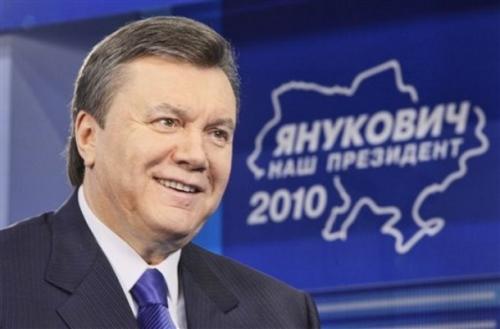President Viktor Yushchenko has little chance of engineering a last-minute election victory; after Ukrainians go to the polls this Sunday, the most likely outcome will be a February run-off pitting the two former prime ministers against each other: Yuliya Tymoshenko and Viktor Yanukovych. Some are portraying this contest as a choice between a "European future" versus a return to the "Russian past."
 If Yanukovych should prevail, does this mean that Ukraine has been "lost" to the West?
If Yanukovych should prevail, does this mean that Ukraine has been "lost" to the West?
Well, for starters, integration with the Euro-Atlantic community is on hold for the foreseeable future. The 2008 NATO summit in Bucharest was the high-water mark—pledging eventual membership for Ukraine in the alliance at some unspecified, distant point in the future. Since that time, there has been no push—particularly by the Western European continental members of NATO—to try and bring that "future" any closer to realization. The expansion of the European Union is also stalled; in short, the EU doesn’t want to bring in large new members that will be net recipients (rather than net contributors) into the coffers of the Union. The observation that the EU will seriously consider Ukraine’s bid for membership only when Ukraine’s economy is capable of providing European-level living standards for the population is right on the mark. An election-day victory by either Tymoshenko or Yanukovych doesn’t change these realities.
So is Ukraine’s only other alternative to rush back into Moscow’s waiting embrace? Not necessarily. Yanukovych is generally considered more pro-Russian than Tymoshenko (although Tymoshenko’s new pragmatic persona indicates that she is also prepared to cut deals with the Kremlin), but if we take him at his word, there are definitive limits. His remarks, published on Ukrainian Christmas, lay out the following: no membership in any alliance, including the Russian-led Collective Security Treaty Organization; potential participation in the Common Economic Space, but on the basis of the "three plus one" initiative, not full membership and full integration; and a renegotiation of the 2009 Russia-Ukraine gas agreement, which he described as being unprofitable to Ukraine.
Does this provide some opportunities for the West? It certainly does.
Keeping Ukraine’s economic links with Europe open and growing should remain a priority, by maintaining Ukraine’s status as an intermediary between the EU and the Common Economic Space, so as to prevent Ukraine’s full absorption into Moscow’s economic sphere. And helping to ensure that Ukraine’s neutrality is a robust one — meaning a state that has no foreign forces based on its territory. If NATO expansion is effectively off the table, can this not help facilitate the transfer of the remaining units of the Russian Black Sea Fleet when the lease expires in 2017? (A separate issue here is ensuring that the Crimea has sufficient new economic opportunities by that point to make up the inevitable shortfall that comes whenever a major military base is moved away.)
Ukraine’s elections don’t have to be seen as a zero-sum contest. And it seems that whether Yanukoyvch or Tymoshenko wins, there will be a new realism in Kyiv. Nabi Abdullaev, writing in today’s Moscow Times, even sounds a note of optimism. What may result is a workable modus vivendi where "Ukraine’s inevitable integration with Europe – a priority announced by all of the presidential candidates – would not be made at the expense of Russia’s national interests."
In the end, this outcome may the best not only for the West and Russia, but for Ukrainians as well.
Nikolas K. Gvosdev [email], an Atlantic Council contributing editor, is on the faculty of the U.S. Naval War College. The views expressed are his own and do not reflect those of the Navy or the U.S. government. AP Photo.
Ukraine Presidential Election 2010 Blog Series:
- Ukraine Elections: Let’s Not Get Carried Away – Nikolas Gvosdev
- Re-Introducing Viktor Yanukovych – Adrian Karatnycky
- EU Energy Security May Depend on Ukraine Election Runoff – Alexandros Petersen
- Ukraine Election: A Yushchenko Post-Mortem – Adrian Karatnycky
- Ukraine Presidential Results: Calling it Right – Adrian Karatnycky
- Yanukovych Comes Out On Top, But Tymoshenko Has Momentum – Damon Wilson
- Ukraine Election Day: First Thoughts – Adrian Karatnycky
- A Glass Half Full: Contemplating a Yanukovych Presidency – Nikolas Gvosdev
- Ukraine’s Anti-Orange Election – Alexander J. Motyl
- Ukraine Election Backgrounder – Adrian Karatnycky
